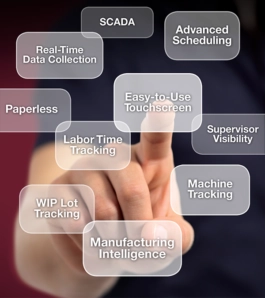Most manufacturers understand the need for ERP or inventory management and financial applications, but when it comes to MES solutions, they sometimes find the reasons to invest in another software solution less than compelling. After all, most manufacturing ERP includes work order scheduling, right?
Well, the answer to that is more complicated than a simple yes or no. MES solutions go well beyond the simplistic work order tracking included in ERP, and include much more functionality to provide insight, connection and control to manufacturers.
What Is MES: Scheduling Software and Performance Monitoring
MES solutions are systems that include shop floor control and scheduling software, and they also include process control solutions to monitor quality and performance on the shop floor. They provide alerts and reports to let production management know what is happening on the shop floor, and they may include capabilities to tie shop floor conditions to quality results, to help improve process controls and process parameters.
What is MES: Connection and Collection
One extremely important way that MES solutions improve on the manufacturing capabilities of ERP is through their ability to connect easily to logic controllers and process control computers. MES solutions typically connect directly to manufacturing equipment, providing real time visibility and performance monitoring, providing deep insight into OEE (Overall Equipment Effectiveness.) In fact, MES solutions were the original enablers of the IoT (Internet of Things), preceding the current hype about machine connectivity by at least 20 to 25 years.
In addition to direct connections to manufacturing equipment, most MES solutions also include the capability to simplify shop floor reporting, through the inclusion of bar code data collection capabilities, a touchscreen interface or RFID or NFC connections. This real time or near-real time capability improves the usefulness of metrics, because the information is produced close to the time of the activity. This enables faster intervention to process anomalies, which can reduce scrap, improve quality and reduce downtime, all important contributors to the bottom line.
What is MES: Metric and Insight
While almost every MES system can measure uptime and downtime, the real value is in additional metrics that more sophisticated solutions provide. Analyzing scrap by operator or cause, identifying bottlenecks, early or idle orders, and monitoring efficiency and utilization can all provide much needed insight to shop floor operations. One of the most important roles of an MES solution is to help you drill down into the details that help identify the root cause of problems or delays.
What is MES: Time and Attendance
Payroll and HR systems are usually the “official” time and attendance systems, but an MES solution can capture the clock in and clock out times and for export to these systems and MES can highlight discrepancies between time card hours and hours worked. This additional level of information allows you to identify productivity by employee and capture indirect time by type—a challenging task with most ERP systems.
What is MES: Scheduling Software
MES solutions enable more sophisticated scheduling tools than other shop floor systems. Users can often use a workbench to optimize the shop schedule and then convert the optimized plan to the actual plan.
MES scheduling software also allows for finite scheduling, while most shop floor scheduling solutions are infinite. Infinite scheduling makes it difficult to predict when orders will actually be completed, and may obscure the need for overtime or reprioritization until it is too late.
Benefits of an MES System
MES solutions provide a rapid ROI because they highlight operational inefficiencies immediately so they can be corrected. MES systems also notify production managers quickly in the event of unplanned downtime and help identify the causes of downtime to prevent future occurrences for the same cause. This rapid response capability helps to reduce schedule disruptions and delays in shipping critical orders, improving cash flow and helping to ensure satisfied customers.
In addition to helping to improve efficiency and utilization, MES solutions improve quality by providing insight into root causes of problems, and by providing alerts when processes move out of tolerance. Eliminating poor quality reduces the cost of scrap and rework, helping to keep costs low and margins high.
MES systems provide more precise scheduling capabilities, usually down to hours and minutes as compared to most ERP-based shop floor control systems which only allow scheduling by day or shift. This improved schedule accuracy helps increase efficiency and improves prioritization of critical orders.
MES solutions are frequently paperless, helping with the manufacturer’s green initiatives and saving the high cost of paper. MES solutions are also compatible with lean manufacturing and may provide input to six sigma or other quality improvement programs. They are invaluable tools for improving virtually every operational metric, but especially quality, efficiency and utilization.
Why Manufacturers Need an MES System
Manufacturing is an industry under siege from all sides. Customers continually demand lower prices, higher quality and more-customized products and services. Competition is fierce and emerging competitors can change the entire landscape in a few weeks or months. Manufacturers need every advantage they can muster to remain profitably in business. In this difficult environment, and MES system is not a luxury or an addon—it’s a competitive necessity.
If you would like to learn more about how an MES solution can help you reduce costs and improve productivity, contact FACTIVITY today.
